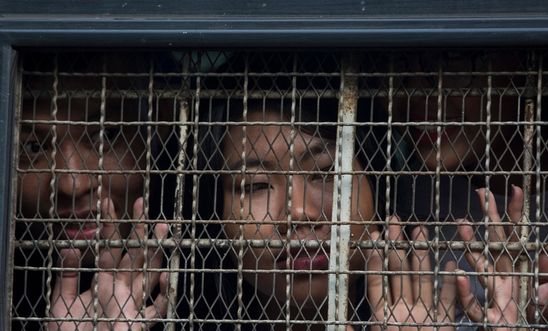
Press releases
Myanmar: Government must release activists and bring an end to 'military-era laws' - new report

Amnesty demands the government amends or repeals oppressive laws that seek to silence those who peacefully speak out against the regime
‘It’s deeply alarming that the authorities are continuing to use repressive laws to arrest and detain activists and journalists amid a global pandemic’ – Clare Algar
Myanmar’s government must immediately release and drop charges against human rights defenders facing imprisonment solely for peaceful activities, and urgently amend or repeal the longstanding repressive laws used to jail them, Amnesty International said in a new report published today.
The report, “I will not surrender”: The criminalisation of human rights defenders and activists in Myanmar, features 16 cases of human rights defenders and civil society activists who have been arrested, prosecuted, and imprisoned over the past 18 months. They include students, a journalist, satirical performers, an environmental activist, a labour rights activist and trade union members, and a Buddhist monk, in cases that span nine states and regions across Myanmar.
Clare Algar, Senior Director for Research, Advocacy and Policy, said:
“Four years after Aung San Suu Kyi came to power, Myanmar remains a country where the slightest criticism of the authorities can land you in jail. Environmental activists, poets and students are among those who have been arrested and prosecuted simply for expressing their opinions.
“After campaigning for human rights for decades and paying a high price for their own activism, it is shocking that Aung San Suu Kyi and her colleagues have done so little to change military-era laws that are still being used to repress and punish critics.
“It’s deeply alarming that the authorities are continuing to use repressive laws to arrest and detain activists and journalists amid a global pandemic. This has to stop. We call on the authorities to immediately institute a moratorium on the use of such law. No one should be arrested or imprisoned under these laws until such time as they can be repealed or amended in line with international human rights standards.”
Students and performers jailed
Just last month, five student activists were imprisoned for protesting against a government-imposed internet shutdown in Rakhine and Chin States, western Myanmar. Two others are in hiding, fearful of arrest and imprisonment under similar charges. The internet shutdown remains in effect, despite authorities confirming a COVID-19 outbreak in recent weeks. The authorities have justified shutting down internet access because of intense fighting between the Myanmar military and the Arakan Army, an ethnic Rakhine armed group. Amnesty is concerned the shutdown will hinder people’s access to important information about the pandemic.
Amnesty’s report also features young members of the “Peacock Generation”, a poetry troupe who perform a traditional form of satire called Thangyat. During their performances in 2019, members of the group wore military uniforms and criticised the Myanmar military. Shortly afterwards, members of the military began targeting the group with criminal complaints. Seven members of the group were arrested in April and May that year. Today, six members of the group are behind bars, serving prison sentences of between two and three years in Yangon’s Insein prison.
Environmental activist and journalist targeted
Police are investigating environmental activist Saw Tha Phoe after he helped a local community in Kayin State, southeastern Myanmar to raise its concerns about the environmental and social impacts of a local cement factory.
He has been charged with “incitement” and is currently in hiding, fearful of arrest. He faces up to two years in prison if found guilty.
Meanwhile Aung Marm Oo, editor of Development Media Group (DMG), a news agency that has been reporting on war crimes during the conflict between the Myanmar military and the AA, is facing five years in jail. He stands accused of violating Myanmar’s Unlawful Associations Act, a repressive law often used to target the country’s ethnic minorities.
In early May 2019 Aung Marm Oo went into hiding after learning of the charge against him in another media outlet. Soon after, police officers, including from Special Branch, visited his offices and home, interrogating his family members and staff.
In March this year, the Myanmar Ministry of Transport and Communications directed all telecommunications operators in Myanmar to block access to DMG’s website, together with others accused of disseminating “fake news”.
Reforms desperately needed before elections
As Myanmar prepares for elections currently scheduled for November 2020, Amnesty urges the authorities – both the NLD-led government and the military – to stop harassing human rights defenders, activists and critics. They should also ensure necessary reforms so that everyone in Myanmar can freely exercise their human rights including their rights to freedom of expression, association, and peaceful assembly.